Eric Benét 1999 interview
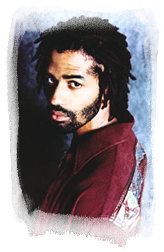
Maria "Miss Funkyflyy" Granditsky:
What have been doing since "True To Myself"? Why has it taken you two years
to make a follow-up?
Eric Benét -Ohh. Because I'm slow (laughs).
Well, I was doing a lot of touring and live shows for "True To Myself" and
once I started making "A Day In The Life", I really just took my time. The
actual production took about a year.
You also did some cameo appearances. You were on Something
For The People's album, on a soundtrack. What else?
-I was on a soundtrack for "The Ride" and I did a song
with a female Brazilian artist, whose name escapes me right now, for her album.
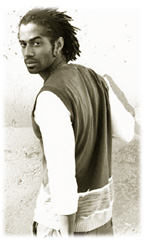 So
what's happened in your life over the two years
since we last talked, more than that your hair has grown longer and you are
showing less skin on your record sleeves (laughs)? So
what's happened in your life over the two years
since we last talked, more than that your hair has grown longer and you are
showing less skin on your record sleeves (laughs)?
-(Laughs) Well, that's really all there is. No, but
my daughter's getting older and.. I'm just happy.
Are you still living in Milwaukee?
-Yes. I've moved to a new house, but I am still living
in Milwaukee.
Still not having any problems when going to the supermarket?
No fans mobbing you?
-Noo, that's not a problem. An American friend sent me a gossip magazine called Sister
2 Sister and it said in there that you were dating Terry Ellis from En Vogue?
Is there any truth to that?
-They say I'm going out with Terry Ellis, they say I'm
going out with Halle Berry, Lisa Ray, none of it is true. But they are all fiiine ladies..
-Yes, THAT is very true. Judging by "A Love Of My Own", the last song on your new
album, you're still looking for Miss Right.
-Yes I am. She's out there somewhere. But I'll find
her (laughs).
How did "True To Myself" and
the singles that were released from it go?
-Well, the critical and the respect level was
very, very good. The record sales weren't extraordinary, but
I think I really established a strong fan base that I can build and
grow a career from.
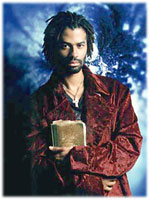 Did
it do as well as you had hoped or expected? Did
it do as well as you had hoped or expected?
-I think every artist that puts a record out
hopes for many, many sales, so no; it didn't do what I hoped it would. But
I established a strong base. I don't know about the States, but over here in Sweden,
you never got the same exposure as, say, Maxwell or Erykah Badu.
-Not over here either, trust me (laughs). But it feels
a bit different this time. You know how it's easy to look back in retrospect and
realize the mistakes one made. Is there anything you think you could have
done differently, in respect of your last album?
-No. Not at all. I don't think there's anything that
I should have done differently. If anything, it would be the marketing and
promotion that should have been handled in another way. To me, the new album, in general, is less retro. There's
not as much Stevie Wonder in there, if you know what I mean? There are more
Hip-Hop elements. Actually, I'd say it's more commercial than "True To Myself".
Would you agree with that?
-Yes, I think you might be right. I worked with some
people that brought out some elements in me that will open me up to a wider
fan base. But then again, many elements in "A Day In The Life" are very retro
and very much like "True To Myself" was. I think I found a balance between
reaching a new audience and still keeping the audience that I have acquired.
In what way do you feel that your new record differs from
your last?
-I think it's a progression of creativity. I tried new
things, reached in new directions; still I think it has cohesiveness and continuity
to it.
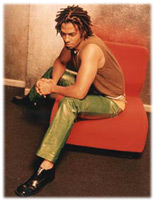 I'll
be perfectly honest with you. When I first read that you'd be working with
Wyclef Jean of the Fugees, I thought, "oh, no, what's next? Is Eric going
to work with Puff Daddy?" I am not impressed with Puff's "creations"
and I can't say I like the Fugees' records either. I was afraid what "A Day
In The Life" would sound like because when you released "True To Myself",
you were like a breath of fresh air, and I feared that you'd lose your distinctive
style by working with these sampling-reliant, cover-version-making producers.
Let's face it, the majority of today's hot R&B artists sound exactly the
same. That's because they all employ the services of a few, established, money-spinning
producers and writers. I'll
be perfectly honest with you. When I first read that you'd be working with
Wyclef Jean of the Fugees, I thought, "oh, no, what's next? Is Eric going
to work with Puff Daddy?" I am not impressed with Puff's "creations"
and I can't say I like the Fugees' records either. I was afraid what "A Day
In The Life" would sound like because when you released "True To Myself",
you were like a breath of fresh air, and I feared that you'd lose your distinctive
style by working with these sampling-reliant, cover-version-making producers.
Let's face it, the majority of today's hot R&B artists sound exactly the
same. That's because they all employ the services of a few, established, money-spinning
producers and writers.
-I totally agree. But what did you think?
I don't think you have lost yourself.
I think it's a brilliant album with many songs that will sound good in years
to come, as well as being very "99". But hey, you didn't
work with Puff Daddy either (laughs).
-(Laughs) No. He's doing the whole next album, though.
Him and Timbaland (laughs).
(Laughs) But seriously, we both know how short the careers
of new artists often are, unless they make a hit record on their first attempt.
That's why, two years ago, I wasn't even sure that you'd be making another
album. It's as if artists just get one shot these days.
-Yes and that says a lot about Warner Brothers. Not
only was I able to make a second record, I was able to make one with this
much enthusiasm behind it. They've been extremely supportive and excited about
"A Day In The Life" and that's a really good thing.
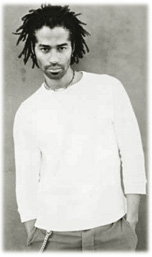 But did you feel pressured that you had to come out with
something more commercial and radio friendly this time? But did you feel pressured that you had to come out with
something more commercial and radio friendly this time?
-Yes. I did feel pressured to sell records at this point.
I think it was very important that I reach a broader audience this time, so
that I will have an opportunity to be as creative as I wanna be on a third
and fourth album. It's important to me.
Was that the reason why you chose to work with outside
producers?
-I think, yeah. I think part of the reason was to reach
a broader audience. But the main reason was that I respect their work.
Can we accredit the first single released from "A Day
In The Life", "Georgy Porgy", and the cover of rock group Kansas's "Dust In
The Wind", to your Midwestern Top 40 radio upbringing?
-Yeah, definitely. I listened to so much classic rock
and folk music back in the day, it's always nice to reintroduce these artists
and songs, to people that would otherwise never have heard of them or their
music.
Was recording Toto's "Georgy Porgy" your idea?
-Actually, it was Fuzzy from Something For The People's
initial idea. We were at a club together, the DJ put the old Toto version
on, and the dance floor went wild. So he came up with it and I though it was
great, so we went for it.
I heard that you ran into some problems with the video
over here in Europe. Apparently, the European version of MTV found the slow-motion
scenes of the car crash too violent and did not air it before 1 AM. Did that
surprise you?
-Yes! I didn't know or think that it was that disturbing
or shocking. I don't understand it at all. I've seen much worse crash crashes,
explosions, people getting shot, raped and murdered on TV. A Ford Explorer
bumps me and it's like "oh, how dare you?"
Those who are not familiar with your past may not understand
what you are trying to say in the video. I see it as a continuation of the
song "When You Were Here" on your last album, which was about mourning the
loss of your girlfriend Tammy (who was killed in a car accident) and about
regretting the things you didn't say and do.
-The whole concept of the whole video -and my interpretation
of the song- is that it's about a relationship in turmoil, a relationship
where both the man and the female have lost sight of what's important. Often
times when something tragic like that happens, it can be like a cold dose
of water and make you realize what really matters. I think that's what I was
trying to say in the video. That through something very traumatic and earthshaking,
many things become clear.
Let's talk about the people
you collaborated with this time. How did you come in contact with Wyclef Jean?
-Through Alison (whose last is name Ball-Gabriel
and is the Vice
President of Black A&R at Warner). She suggested it and I respected his
work so I thought it would be a good idea. We met each other and a couple
of hours later we had a song written and finished. That's not normally how
I work. It usually takes me much longer to write a song. We came into some
creative mode and it just flowed. It worked.
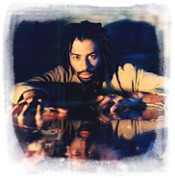 Can you tell me a little bit about the
other people involved? Of course, I recognize your cousin George Nash, Jr.,
plus Demonté Posey and Sauce and Fuzzy from Something For The People, who
were on your last album. Can you tell me a little bit about the
other people involved? Of course, I recognize your cousin George Nash, Jr.,
plus Demonté Posey and Sauce and Fuzzy from Something For The People, who
were on your last album.
-I worked with James Poyser and Vikter Duplaix;
they've done a lot of work with Lauryn Hill, the Roots, and Erykah Badu. Same
thing, we really gelled and vibed together in the studio. We wrote some things
and it really worked out. I also worked with Ali Shahi Muhammad from A Tribe
Called Quest. It was as if we had known each other all our lives. We just
got together in the studio and started creating. We pumped out quite a few
things, in fact, some of the stuff didn't go on the album, but I am saving
them for use later. Brian Alexander Morgan did the "Dust In The Wind" cover.
Brian actually did that version for his own solo project, but I heard it and
fell in love with it. Then, there's of course Me' Shell Ndegé Ocello, Tamia,
Faith Evans and Roy Ayers. It's really a complete body of work, I think.
One of my favorite tracks is "Ghetto
Girl", which features Me'Shell Ndegé Ocello, and is produced by Sauce. I don't know if it's a synthesizer bass, or what
gadget you are using there, but it really has a special sound.
-Yeah, it's an unusual sounding song. Demonté
and I wrote that song back home it Milwaukee. We gave it to Sauce to give
it another flavor.
You seem to enjoy working with the veterans in the music business.
On "True To Myself", you cooked up some heavy-duty funk with the late, great Roger
Troutman and on the new set you've hooked up with Roy Ayers.
-You learn a lot of things from the veterans. Unfortunately,
I didn't get a chance to work with Roy in the studio when he cut the track. I
had an engagement on the other side of the country and that was the only time
he could do it, so we never actually met. That's not good, but hopefully we'll
meet the next time I am in New York.
As I recollect, your last album was recorded in Milwaukee,
with very little interference from your label. Was the recording experience made
any different this time because of the traveling from city to city and studio
to studio?
-Yes, that made it a different experience. But the main
change was that by working with all these other people, I got a chance to grow.
It was a good thing.
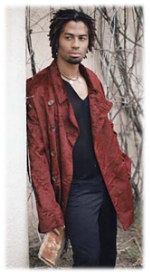 My favorite track and the song that I feel is the most 70's
influenced on your new CD is "Love The Hurt Away". It's got a "churchy" feel to
it and it essentially sounds like it could have been on "True To Myself". It's
a brilliant song. Do you have a favorite track? My favorite track and the song that I feel is the most 70's
influenced on your new CD is "Love The Hurt Away". It's got a "churchy" feel to
it and it essentially sounds like it could have been on "True To Myself". It's
a brilliant song. Do you have a favorite track?
-Thank you. I really don't have a favorite, but "Love The
Hurt Away" is a song that I can listen to over and over again and I really love
performing it. It feels like home.
I read in the bio that you keep a journal and that it's been
an important source of inspiration for you.
-Yeah. I flicked through it, read a couple of passages about events and things
that have happened over the years, and it would inspire a lyric or a melody. That's
where the name of the album came from.
Do you write every day?
-No. Hardly every month. I write every now and then when
I feel like it.
I saw your show last night for the very first time and I was
impressed, not only with you, but with your band. They were tight! It's not very
common to see nine people live on stage! Can you tell me a little more about them?
-Sure! I have three keyboard players, a bass player, a lead
guitarist, a drummer and three background singers. Eddie M plays keyboards and
saxophone, Tony Boyd is the bass player, Nick Smith's on piano and Leroy Taylor's
on organ. Then I have John Paris on drums and Spanky on guitar. My background
singers are Tina and Erica Atkins and a girl named Vee-Lay. I've had pieces of
this band for a long time; there have been member changes, like the background
singers, Spanky and one of the keyboard players are new. But for the most part,
everybody else has been onboard for a while.
Do you ever get nervous before a show?
-I always get nervous right before I go on and if my voice
is in a bad shape like it is now with this cold I have, then I'm nervous throughout
the show. Under those circumstances, I have to think quick and come up with new
ways to sing the melodies that are less strenuous on my voice.
Well, Eric, we have to end here. Thanks so much for the interview.
I wish you a speedy recovery from your cold and the best of luck with "A Day In
the Life".
-Thank you! It's been a pleasure speaking with you again.
Is there anything you want to add?
-Yes. I want to thank each and everyone that has been sending
me e-mails. If anyone wants to write to me, my e-mail address is tru2myslf@aol.com.
|


 So
what's happened in your life over the two years
since we last talked, more than that your hair has grown longer and you are
showing less skin on your record sleeves (laughs)?
So
what's happened in your life over the two years
since we last talked, more than that your hair has grown longer and you are
showing less skin on your record sleeves (laughs)? Did
it do as well as you had hoped or expected?
Did
it do as well as you had hoped or expected? I'll
be perfectly honest with you. When I first read that you'd be working with
Wyclef Jean of the Fugees, I thought, "oh, no, what's next? Is Eric going
to work with Puff Daddy?" I am not impressed with Puff's "creations"
and I can't say I like the Fugees' records either. I was afraid what "A Day
In The Life" would sound like because when you released "True To Myself",
you were like a breath of fresh air, and I feared that you'd lose your distinctive
style by working with these sampling-reliant, cover-version-making producers.
Let's face it, the majority of today's hot R&B artists sound exactly the
same. That's because they all employ the services of a few, established, money-spinning
producers and writers.
I'll
be perfectly honest with you. When I first read that you'd be working with
Wyclef Jean of the Fugees, I thought, "oh, no, what's next? Is Eric going
to work with Puff Daddy?" I am not impressed with Puff's "creations"
and I can't say I like the Fugees' records either. I was afraid what "A Day
In The Life" would sound like because when you released "True To Myself",
you were like a breath of fresh air, and I feared that you'd lose your distinctive
style by working with these sampling-reliant, cover-version-making producers.
Let's face it, the majority of today's hot R&B artists sound exactly the
same. That's because they all employ the services of a few, established, money-spinning
producers and writers. But did you feel pressured that you had to come out with
something more commercial and radio friendly this time?
But did you feel pressured that you had to come out with
something more commercial and radio friendly this time? Can you tell me a little bit about the
other people involved? Of course, I recognize your cousin George Nash, Jr.,
plus Demonté Posey and Sauce and Fuzzy from Something For The People, who
were on your last album.
Can you tell me a little bit about the
other people involved? Of course, I recognize your cousin George Nash, Jr.,
plus Demonté Posey and Sauce and Fuzzy from Something For The People, who
were on your last album. My favorite track and the song that I feel is the most 70's
influenced on your new CD is "Love The Hurt Away". It's got a "churchy" feel to
it and it essentially sounds like it could have been on "True To Myself". It's
a brilliant song. Do you have a favorite track?
My favorite track and the song that I feel is the most 70's
influenced on your new CD is "Love The Hurt Away". It's got a "churchy" feel to
it and it essentially sounds like it could have been on "True To Myself". It's
a brilliant song. Do you have a favorite track?